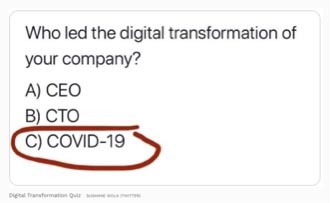What is digital transformation?
 Digital transformation is the process of using digital technologies to create new—or modify existing—business processes, culture, and customer experiences to meet changing business and market requirements. This reimagining of business in the digital age is digital transformation. –Salesforce
Digital transformation is the process of using digital technologies to create new—or modify existing—business processes, culture, and customer experiences to meet changing business and market requirements. This reimagining of business in the digital age is digital transformation. –Salesforce
One of the gifts of times of crisis is the accelerated pace of innovation. In a matter of weeks, we brought children home and put virtually all education online. This kind of structural change typically takes decades or sometimes generations. Just imagine all the mind-numbing committee meetings. A crisis removes or overrides the natural resistance of humans to change. There is a “have-to attitude.” My definition of “strategic” is very simple: “doing things before you have to” because cultivating a “have-to attitude” is really challenging outside of a crisis.
We are in the midst of a public health crisis whose infectious nature is causing serious economic pain which, by all indicators, will result in a very new normal. “The scale of change and the speed at which it’s happening is shining a bright light on the fact that companies are facing a once-in-a-generation shift. And for all the uncertainty about what the future will look like it’s clear already that it will be digital,” says McKinsey. What will that new normal look like for the print industry? We don’t know. What we do know is that print businesses who are further down their journey of digital transformation will perform far better in the new normal.
Do you have an online strategy for your print business? “Recent customer-behavior research shows that digital interaction with B2B customers is now two times more important than traditional channels—more than a 30% jump since before the COVID-19 crisis hit,” says McKinsey. As I wrote in a previous article, email does not count as digital interaction. A differentiator moving forward (even more now than ever) will be the digital tools you use to engage with your customers. Think about digital transformation in terms of the speed in which you adopt new and improved ways to engage with your customers…
In person/pen/paper > Snail Mail > Phone > Fax > Email > web-to-print/portals > Real time online collaboration?
Remember…“Digital transformation is the process of using digital technologies to create new—or modify existing—business processes.” Nowhere does it say, “wait until your customer asks for it.” The future is digital, that we know for sure; COVID-19 is a crisis that just accelerated what was already happening. Tech-ready companies are accelerating their transformations. Laggards are hunkering down and just trying to survive. Even if your product is physical, you have to deploy digital tools (just think software) in order to optimize the business. The very best staff in the world cannot compete with a digitally optimized competitor.
I like to think of software as an employee that you can hire to do certain tasks. This specific kind of employee is not good at everything, but it can outperform any human at some things. For example:
- Math. (Even better than Katherine Johnson, the famed NASA mathematician about whom John Glenn said he would not go into space without her first checking the numbers.)
- Calculating optimal ganging of jobs on an imposition
- Calculating schedule optimization (with accurate inputs)
- Calculating job specific costs
- Calculating sales commissions
- Calculating everything…
- Data Storage
- Keeping track of your customers
- Keeping track of your jobs
- Keeping track of your contacts
- Keeping track of your raw materials
- Keeping track of everything...
- Performing repetitive (programmable) tasks reliably (e.g. sending email alerts when products are shipped)
- Enable self-service by your customers. This is so important—even more important since COVID-19. Your customers want to be empowered to do more. Most print businesses don’t allow their customers to do anything but email them.
Software is a resource that you can deploy. My colleague Jane Mugford always says, let your system (software) run your business and your people run the system. Digital transformation is the transition of people-powered business processes to software-managed business processes. When your business is reliant on a few key individuals always being there to make it work, you are people-powered. When your business is software-managed, your key people are still there, they are just working on the next level of digital transformation!















Discussion
Only verified members can comment.